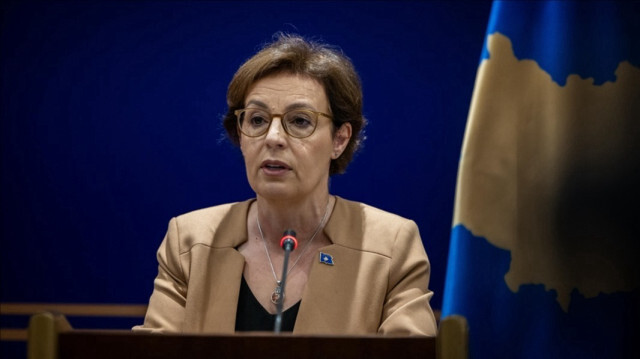
‘It's about time France and Germany take the lead and bring Kosovo in the Council of Europe,' says Gervalla-Schwarz
Kosovo's foreign minister has called on Germany and France to take the lead in supporting her country's membership in the Council of Europe (CoE).
“Kosova needs to join as soon as possible the CoE, because the assembly has already stated that Kosovo has fulfilled all the requirements,” Donika Gervalla-Schwarz told Anadolu.
“We have overfulfilled the requirements, so it's about time that France and Germany take the lead and bring Kosovo in the Council of Europe,” she said, stressing that her country is resolute in its determination to join major European structures.
Kosovo, Europe's youngest country, declared independence from Serbia in 2008, and is currently recognized by 117 nations. Pristina is seeking membership in both the EU and NATO.
In April, the CoE's Parliamentary Assembly voted in favor of Kosovo's membership in the organization, but a final decision on membership has not been taken yet.
Gervalla-Schwarz thanked countries that supported Kosovo's efforts to gain broader international recognition, and asked for stronger support from the EU's heavyweights, Germany and France, for its European integration process.
“If you look at Kosovo today, and if you look at all numbers and all results that international organizations are mentioning, you will see that Kosovo is the champion of democracy and rule of law in our region in the Western Balkans,” she said.
“Kosovo is the example that shows that, in the EU, you can take countries which are committed to implement rule of law, to increase the democratic standards, and to work for the people so that they see a better perspective. There is no reason why the EU should not bring Kosovo in the EU.”
At the same time, she stressed, Euro-Atlantic integration, the country's NATO membership, remains a key objective for Kosovo.
“Because without NATO membership – and only NATO is the guarantee for freedom and peace in our region – I do not believe that Serbia will be stopped,” she added.
Kosovo's aspirations to join the EU and NATO have been supported by the majority of the member states, but Pristina also faces significant challenges on its path to full integration with Europe.
Five out of 27 EU member states have not yet recognized Kosovo's independence, and a lack of progress in Serbia-Kosovo dialogue, and recurrent ethnic tensions in northern Kosovo, remain the biggest challenges.
Some European countries have signaled that they will decide on the recognition according to the outcome of the Belgrade-Pristina dialogue.
Gervalla-Schwarz underlined that her country's membership to European structures was important to counter destabilizing activities of some foreign powers, and to ensure peace and stability in the region.
“I really believe that if the EU does not care enough about its own continent, and leaves space for others who do not want the EU, who do not want our way of life, who do not share our values and principles, then it will become even more difficult, and we will need to deal with conflicts and tensions,” she said.

